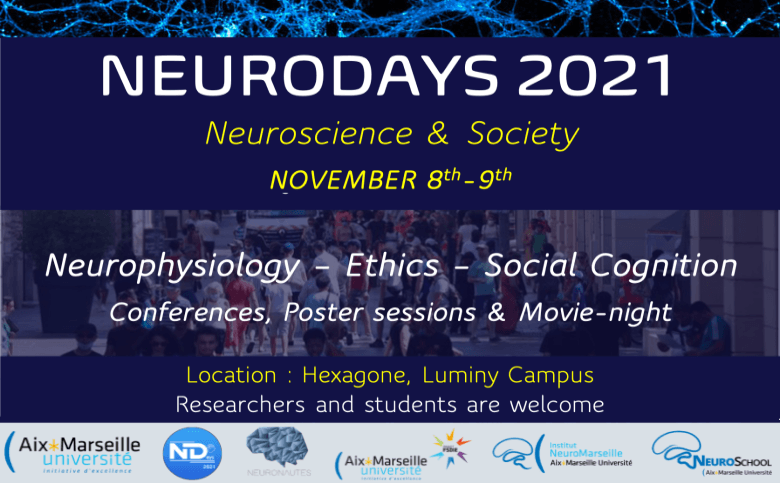Description de la soumission d'un avis

NeuroDays 2021 : neuroscience & societé
Les Neurodays 2021 auront lieu les 8 et 9 novembre 2021 !
Les Neurodays 2021 auront lieu les 8 et 9 novembre 2021 !
L’année et demie écoulée nous a appris une fois de plus que l’organisation sociale est au cœur de la civilisation humaine. Après avoir traversé des moments très difficiles, nous pouvons enfin reprendre certaines activités sociales « normales ». Nous, les doctorants de la NeuroSchool, avons trouvé que c’était l’occasion la plus appropriée de nous réunir, de discuter et de réfléchir à certains aspects sociaux des neurosciences dans le cadre des NeuroDays de cette année, sur le thème « Neuroscience et société ».
Réservez vos dates des 8 et 9 novembre 2021 pour participer à cet événement à l’Hexagone, Campus de Luminy. Nous vous promettons des conférences passionnantes, des sessions de posters interactives, une soirée cinéma et une table ronde avec nos intervenants.
Venez nous rejoindre ! (Inscription obligatoire et pass sanitaire)

Programme des NeuroDays
L'édition 2021 sera pleine de surprises ! Il y aura une soirée cinéma, un concours de posters et des tables rondes de mentorat avec les conférenciers ! Le tout entrecoupé de présentations de chercheurs de renom.

Soirée ciné | le 8 novembre de 17h à 19h | Campus de Luminy
Documentaire sur les neurosciences avec Rochelle Ackerley
Intervenants

"We have gained much knowledge in recent years about the mechanisms involved in human touch, from the peripheral encoding of touch to its central interpretation. When most people think of touch, they think about the discriminative, conscious aspects, such as where it happens, for how long, and other sensory factors like roughness. Such information is encoded and relayed by fast-conducting myelinated mechanoreceptive afferents. However, many studies investigate positive affective touch (pleasant touch) and we know that a specific class of slowly-conducting mechanoreceptors in the skin codes such gentle, moving touch optimally. The input from these receptors, so-called C-tactile (CT) afferents, is thought to underlie the pleasant and emotional aspects of touch, such as in social and affiliative touch between friends and family."

"From 1974 to 2008 I studied the neurotransmission mediated by dopamine in the brain of rats and mice. In this research field I published 96 scientific articles in peer-reviewed international journals (including Nature , J. Neuroscience and PNAS ). I collaborated as principal investigator with several foreign researchers in prestigious universities. In 2007 I realized that there is often a huge gap between Neuroscience findings and their covering by mass medias. Since then, I decided to investigate the mediatization of Neuroscience researches. In the field of Science Communication I already published two studies as principal investigator and ten as senior author in peer-reviewed international journals as well as three opinion article. Two of them have been echoed by newspapers ( The New York Times, The Economist, Le Monde, Le Figaro )."

Jean-Michel Revest completed his Ph.D. in Cellular and Structural Biology and Microbiology (January 1998) at the University of Marseille (Luminy). He joined the Imperial Cancer Research Fund (ICRF-Cancer UK- London) as a postdoctoral fellow to learn gene knockout technology by homologous recombination and to work on molecular signaling pathways. He obtained a tenured position at CNRS in 2001. Since he has joined the Neurocentre Magendie in 2001 in Bordeaux in the team directed by Pier Vincenzo Piazza, he started developing several models of inducible transgenic mice. Then he focused its research to understand the molecular signaling cascades underlying the beneficial/deleterious effects of steroid hormones (e.g. glucocorticoids) on memory and the inhibiting effect of neurosteroid pregnenolone on CB1-dependent behavioral effects, notably the harmful effects of THC (cannabis active principle) and of the cognitive deficits impairment in Down Syndrome (Trisomy 21). From this research also emerged several patents followed by the co-foundation of the Biotech Aelis Farma with Drs. Pier Vincenzo Piazza, Monique Vallée, Giovanni Marsicano and Daniela Cota. Since 2018 he is leading the team “Physiopathology and therapeutic approaches of stress-related diseases” at Bordeaux (France). https://www.bordeaux-neurocampus.fr/en/staff/jean-michel-revest/

“Humans exhibit a social behavior repertoire of staggering complexity. We are interested in identifying social networks driving specific prosocial behaviors such as food sharing or altruism as well as unravelling the control and plasticity of such behaviors at the molecular level. For that purpose, we are combining different experimental models (in vitro and in vivo work with rodents, marmosets, and humans) and a palette of techniques ranging from behavioral testing, single-cell transcriptomics or genome-editing in vivo.
Epigenetic mechanisms are important regulators of brain adaptations to environmental modifications. Among them, microRNAs, a class of short non-coding RNAs, have attracted much research attention. Over the last 10 years, we have systematically investigated which microRNAs are deregulated in different physiological and pathological contexts and investigated how their expression levels impinge on target genes and network activity. We have also generated a number of novel tools (e.g. for in vivo manipulation of specific miRNAs in precise brain networks) which will help us further understand the function of brain microRNAs.”



